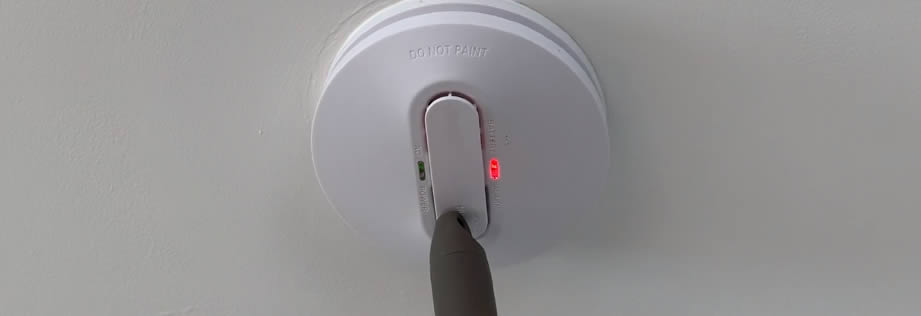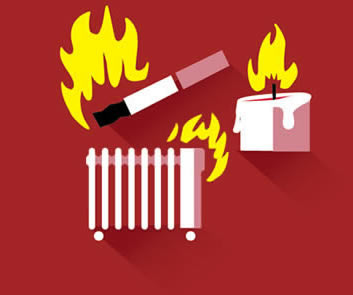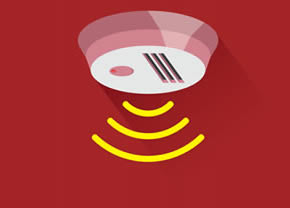- Home
- Fire safety
- Home fire safety
- Summer fire safety
Summer fire safety
Help us, help you by taking action to ensure you and your family stay safe over summer. If you do your bit to minimise the risks in your home, we can all stay safer together.
Summer checklist
Did you know that you will not smell smoke while asleep? Only working smoke alarms save lives.
- Test that your smoke alarm/s are working. If not, change the batteries or replace the alarm.
- Check the smoke alarm is in date. Smoke alarms have a lifespan of ten years.
- Give the smoke alarm a vacuum, if you haven't done so in the last six months, to remove dust and any insects.
To meet legislation you must have at least one working smoke alarm on each level of the home placed between bedrooms and living areas, it's the law. FRNSW also recommends having one in each bedroom. Hardwired and interconnected is best.
Find out more about buying, installing and maintaining your smoke alarm

Did you know that you will not smell smoke while asleep? Only working smoke alarms save lives.
- Test that your smoke alarm/s are working. If not, change the batteries or replace the alarm.
- Check the smoke alarm is in date. Smoke alarms have a lifespan of ten years.
- Give the smoke alarm a vacuum, if you haven't done so in the last six months, to remove dust and any insects.
To meet legislation you must have at least one working smoke alarm on each level of the home placed between bedrooms and living areas, it's the law. FRNSW also recommends having one in each bedroom. Hardwired and interconnected is best.
The backyard barbie can be a common cause of fires and injury during summer. Keep barbecues clean and ensure all gas hoses and connections are tight with no leakage.
- Check gas cylinder and hoses for leaks by brushing or spraying with soapy water.
- There should be an adult in charge of a lit barbecue at all times.
- After using your barbecue, remove all excess fat so it doesn't become a fire hazard.
- Check the expiry date before using a gas cylinder. Dispose of old and unwanted gas cylinders safely. Contact your local council for more information.
- Liquid Petroleum Gas (LPG) can be extremely dangerous if stored or used incorrectly.
- Before lighting the BBQ, check your local fire danger rating, there may be a Total Fire Ban. Visit the Fire Danger Ratings and Total Fire Bans page on the NSW Rural Fire Service Website here. [external link]

The backyard barbie can be a common cause of fires and injury during summer. Keep barbecues clean and ensure all gas hoses and connections are tight with no leakage.
- Check gas cylinder and hoses for leaks by brushing or spraying with soapy water.
- There should be an adult in charge of a lit barbecue at all times.
- After using your barbecue, remove all excess fat so it doesn't become a fire hazard.
- Check the expiry date before using a gas cylinder. Dispose of old and unwanted gas cylinders safely. Contact your local council for more information.
- Liquid Petroleum Gas (LPG) can be extremely dangerous if stored or used incorrectly.
- Before lighting the BBQ, check your local fire danger rating, there may be a Total Fire Ban. Visit the Fire Danger Ratings and Total Fire Bans page on the NSW Rural Fire Service Website here. [external link]
When setting up christmas lights or decorative electric displays, use only one item per power socket and don't overload power boards or piggy back double adaptors.
- Switch off all electrical displays and decorative lights before going to bed.
- Check lights and electronic decorations for faults, worn plugs and frayed cords.
- Only use decorative lights that have an Australian Standards label and follow manufacturer's instructions on setting up and operating.
- Decorative lights may become very hot so keep away from children and flammable materials such as wrapping paper, decorations or curtains and don't leave burning candles unattended.

When setting up christmas lights or decorative electric displays, use only one item per power socket and don't overload power boards or piggy back double adaptors.
- Switch off all electrical displays and decorative lights before going to bed.
- Check lights and electronic decorations for faults, worn plugs and frayed cords.
- Only use decorative lights that have an Australian Standards label and follow manufacturer's instructions on setting up and operating.
- Decorative lights may become very hot so keep away from children and flammable materials such as wrapping paper, decorations or curtains and don't leave burning candles unattended.
Last bushfire season taught us some terrifying lessons about the importance of being prepared and having a plan. If you and your home are well prepared, you stand a better chance of surviving a bushfire.
- You can make a bushfire plan online in as little as five minutes at www.myfireplan.com.au.
- Discuss what to do if a bushfire threatens your home.
- Prepare your home and get it ready for the bushfire season.
- Know the bushfire alert levels.
- Keep all bushfire information numbers, websites and download the Fires Near Me app.
Further information can be found at www.rfs.nsw.gov.au/resources/bush-fire-survival-plan

Last bushfire season taught us some terrifying lessons about the importance of being prepared and having a plan. If you and your home are well prepared, you stand a better chance of surviving a bushfire.
- You can make a bushfire plan online in as little as five minutes at www.myfireplan.com.au.
- Discuss what to do if a bushfire threatens your home.
- Prepare your home and get it ready for the bushfire season.
- Know the bushfire alert levels.
- Keep all bushfire information numbers, websites and download the Fires Near Me app.
The leading cause of home fires in NSW is leaving cooking unattended. Never leave cooking unattended. Stay in the kitchen while cooking and turn off the stove before you leave.
- Don't put anything metallic in the microwave and always double-check the timer.
- Keep matches and lighters out of reaches of children.
- Avoid cooking under the influence of alcohol or drugs.
- Keep loose clothing, fabrics, tea towels, curtains and flammable items away from the stove.
- Keep your oven, rangehood and grill clean and in good working order. A build-up of grease and fat can ignite in a fire.

The leading cause of home fires in NSW is leaving cooking unattended. Never leave cooking unattended. Stay in the kitchen while cooking and turn off the stove before you leave.
- Don't put anything metallic in the microwave and always double-check the timer.
- Keep matches and lighters out of reaches of children.
- Avoid cooking under the influence of alcohol or drugs.
- Keep loose clothing, fabrics, tea towels, curtains and flammable items away from the stove.
- Keep your oven, rangehood and grill clean and in good working order. A build-up of grease and fat can ignite in a fire.
Having a home escape plan in conjunction with a working smoke alarm will greatly increase your chances of getting out safely. Every second counts.
If there is a fire in your home, do not wait, EVERY SECOND COUNTS, GET OUT and STAY OUT and then call Triple Zero (000). Never go back inside a burning building.
Remember to consider the special needs of children, the elderly or the disabled when developing your escape plan.
- Draw your escape plan, and discuss it with your whole family. Download your grid here (PDF).
- Know and record two safe ways out of every room. Make sure that your windows and doors are not obstructed and can be unlocked and opened quickly if necessary.
- Practise your escape plan regularly with the whole household including pets. Your letter box is a great place to wait for firefighters arrival.
- As you escape make sure you close internal doors behind you. This can reduce fire spread and minimise damage.

Having a home escape plan in conjunction with a working smoke alarm will greatly increase your chances of getting out safely. Every second counts.
If there is a fire in your home, do not wait, EVERY SECOND COUNTS, GET OUT and STAY OUT and then call Triple Zero (000). Never go back inside a burning building.
Remember to consider the special needs of children, the elderly or the disabled when developing your escape plan.
- Draw your escape plan, and discuss it with your whole family. Download your grid here (PDF).
- Know and record two safe ways out of every room. Make sure that your windows and doors are not obstructed and can be unlocked and opened quickly if necessary.
- Practise your escape plan regularly with the whole household including pets. Your letter box is a great place to wait for firefighters arrival.
- As you escape make sure you close internal doors behind you. This can reduce fire spread and minimise damage.
Did you know?

The use of heaters, cigarettes and candles are common causes of fires.

When you're asleep, you won't smell the smoke from a fire.

You're twice as likely to die in a home fire if you don't have a working smoke alarm.
Fire and Rescue NSW responds to approximately
4500
residential fires each year. Half of these fires start in the kitchen, mostly due to unattended cooking.

Electrical appliances and faults cause almost 40% of home fires.